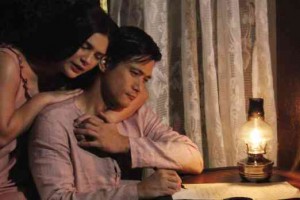A review of Bonifacio: Ang Unang Pangulo
Editor’s Note: This review by National Artist for Literature Bienvenido Lumbera was first published as a Facebook note; it is reprinted with his permission.
Except in its second year when it awarded as best film Eddie Romero’s “Ganito Kami Noon, Paano Kayo Ngayon?,” the Metro Manila Film Festival has not lived up to expectations that it would bring about a harvest of superior film expected of a “festival.” In the years that followed, authorities behind the festival made box-office income of a film as an all-determining criterion for “best film.” As a consequence,the MMFF awards, for a variety of reasons, have long lost prestige value. This season, however, a film worthy of being honored as “best” is in the line-up of offerings in the festival.
BONIFACIO, ANG UNANG PANGULO starring box-office names Robin Padilla, Daniel Padilla and Vina Morales and bearing the weight of social relevance that distinguished Romero’s classic, promises to outdistance in aesthetic worth the usual “MMFF offerings” of slapstick comedies, teenage love, and horror fantasies aimed at winning the “box-office blockbuster award.” The film takes up the Bonifacio story and asserts an approach to its subject matter eschewing popular textbook historical accounts of the hero’s leadership in the Katipunan revolt. The film opens with the garrotte execution of the three martyr priests of the Cavite Mutiny. A young Andres was among the crowd that witnessed the tumultuous public execution and we see him pick up on the lawn a soiled handkerchief presumably owned by one of the priests. The handkerchief will later figure as an affirmation of the mature Bonifacio’s revolutionary resolve. Later, at a meeting of ilustrados discussing the reformist La Liga Filipina, a youthful Bonifacio has a chance meeting with an elder Jose Rizal.
When Rizal was jailed, Andres visits the author of Noli and Fili and proposes to engineer Rizal’s escape. Rizal is not persuaded by the plot, and what follows is the frustrations in the recruitment of more members of the Katipunan, culminating in the raid on the office of the Diario de Manila resulting from the exposure of the insurgents’ use of its press.
Bonifacio rallies members of the Katipunan in the yard of Tandang Sora’s house, and the revolution is triggered off by the tearing of cedulas in what historical accounts have dramatized as the “Cry of Balintawak.”
Inserted into the narrative of Bonifacio’s role in the revolution of 1896 is the story of three students in the present-day history class of an old professor knowledgeable in the process of revolutionary struggle. This relates the account of the arduous work of dismantling Spanish hegemony to the growing revolutionary consciousness of the contemporary generation of students without preachifying in the Bonifacio narrative.
Article continues after this advertisementThe director of the film is a young film student in a U.S. university who helped write the script. His name, Enzo Williams, is certain to become familiar in the immediate future. Williams is a Fil-Am youth, whose first feature film, manifests a practised and matured hand unusual for a young man of his age. He is editor of his own film and his effective use of sound and music marks him out as a filmmaker of sensitivity and sense. Above all, his handling of actors, both the veterans and and the extras, indicates confidence in his ability to draw out of his performers acting compatible with his vision of his subject matter. Here is a new filmmaker whose potential as an artist encourages hope for great Filipino films in the coming years
